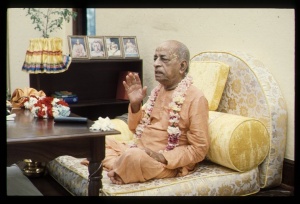SB 10.57.38-39: Difference between revisions
m (1 revision(s)) |
(Vanibot #0018 edit: make synonym terms in Sanskrit italic in SB - Vanisource) |
||
| Line 1: | Line 1: | ||
{{info | {{info | ||
|speaker=Lord | |speaker=Lord Kṛṣṇa the Supreme Personality of Godhead | ||
|listener= | |listener=Akrūra | ||
}} | }} | ||
[[Category:Srimad-Bhagavatam - Canto 10 Chapter 57]] | |||
[[Category:Bhagavatam Verses Spoken by Lord Krsna - Vanisource|105738]] | |||
<div style="float:left">'''[[Srimad-Bhagavatam]] - [[SB 10|Tenth Canto]] - [[SB 10.57: Satrajit Murdered, the Jewel Returned|Chapter 57: Satrājit Murdered, the Jewel Returned]]'''</div> | |||
<div style="float:right">[[File:Go-previous.png|link=SB 10.57.37]] '''[[SB 10.57.37]] - [[SB 10.57.40]]''' [[File:Go-next.png|link=SB 10.57.40]]</div> | |||
{{RandomImage}} | |||
{{SBnotice}} | |||
==== TEXTS 38-39 ==== | ==== TEXTS 38-39 ==== | ||
<div | <div class="verse"> | ||
tathāpi durdharas tv anyais | :tathāpi durdharas tv anyais | ||
tvayy āstāṁ su-vrate maṇiḥ | :tvayy āstāṁ su-vrate maṇiḥ | ||
kintu mām agrajaḥ samyaṅ | :kintu mām agrajaḥ samyaṅ | ||
na pratyeti maṇiṁ prati | :na pratyeti maṇiṁ prati | ||
darśayasva mahā-bhāga | |||
bandhūnāṁ śāntim āvaha | :darśayasva mahā-bhāga | ||
avyucchinnā makhās te 'dya | :bandhūnāṁ śāntim āvaha | ||
vartante rukma-vedayaḥ | :avyucchinnā makhās te 'dya | ||
:vartante rukma-vedayaḥ | |||
</div> | </div> | ||
| Line 21: | Line 27: | ||
==== SYNONYMS ==== | ==== SYNONYMS ==== | ||
<div | <div class="synonyms"> | ||
tathā | ''tathā api''—nevertheless; ''durdharaḥ''—impossible to hold on to; ''tu''—but; ''anyaiḥ''—by others; ''tvayi''—with you; ''āstām''—should remain; ''suvrate''—O trustworthy keeper of vows; ''maṇiḥ''—the jewel; ''kintu''—only; ''mam''—Me; ''agra-jaḥ''—My elder brother; ''samyak''—completely; ''na pratyeti''—does not believe; ''maṇim prati''—concerning the jewel; ''darśayasva''—please show it; ''mahā-bhāga''—O most fortunate one; ''bandhūnām''—to My relatives; ''śāntim''—peace; ''āvaha''—bring; ''avyucchinnāḥ''—uninterrupted; ''makhāḥ''—sacrifices; ''te''—your; ''adya''—now; ''vartante''—are going on; ''rukma''—of gold; ''vedayaḥ''—whose altars. | ||
</div> | </div> | ||
{{SBcollapse}} | |||
==== TRANSLATION ==== | ==== TRANSLATION ==== | ||
<div | <div class="translation"> | ||
"Nevertheless, the jewel should remain in your care, O trustworthy Akrūra, because no one else can keep it safely. But please show the jewel just once, since My elder brother does not fully believe what I have told Him about it. In this way, O most fortunate one, you will pacify My relatives. [Everyone knows you have the jewel, for] you are now continually performing sacrifices on altars of gold." | "Nevertheless, the jewel should remain in your care, O trustworthy Akrūra, because no one else can keep it safely. But please show the jewel just once, since My elder brother does not fully believe what I have told Him about it. In this way, O most fortunate one, you will pacify My relatives. [Everyone knows you have the jewel, for] you are now continually performing sacrifices on altars of gold." | ||
</div> | </div> | ||
| Line 35: | Line 41: | ||
==== PURPORT ==== | ==== PURPORT ==== | ||
<div | <div class="purport"> | ||
Although technically Satyabhāmā's sons had a right to the jewel, Lord Kṛṣṇa decided to leave the jewel in the care of Akrūra, who was using the jewel's wealth to continually perform religious sacrifices. Indeed, Akrūra's ability to perform such rituals on altars of gold was an indication of the jewel's potency. | Although technically Satyabhāmā's sons had a right to the jewel, Lord Kṛṣṇa decided to leave the jewel in the care of Akrūra, who was using the jewel's wealth to continually perform religious sacrifices. Indeed, Akrūra's ability to perform such rituals on altars of gold was an indication of the jewel's potency. | ||
</div> | </div> | ||
__NOTOC__ | </div> | ||
</div> | |||
<div style="float:right">[[File:Go-previous.png|link=SB 10.57.37]] '''[[SB 10.57.37]] - [[SB 10.57.40]]''' [[File:Go-next.png|link=SB 10.57.40]]</div> | |||
__NOTOC__ | |||
__NOEDITSECTION__ | |||
Revision as of 17:02, 1 December 2017

A.C. Bhaktivedanta Swami Prabhupada
Please note: The synonyms, translation and purport of this verse were composed by disciples of Śrīla Prabhupāda
TEXTS 38-39
- tathāpi durdharas tv anyais
- tvayy āstāṁ su-vrate maṇiḥ
- kintu mām agrajaḥ samyaṅ
- na pratyeti maṇiṁ prati
- darśayasva mahā-bhāga
- bandhūnāṁ śāntim āvaha
- avyucchinnā makhās te 'dya
- vartante rukma-vedayaḥ
SYNONYMS
tathā api—nevertheless; durdharaḥ—impossible to hold on to; tu—but; anyaiḥ—by others; tvayi—with you; āstām—should remain; suvrate—O trustworthy keeper of vows; maṇiḥ—the jewel; kintu—only; mam—Me; agra-jaḥ—My elder brother; samyak—completely; na pratyeti—does not believe; maṇim prati—concerning the jewel; darśayasva—please show it; mahā-bhāga—O most fortunate one; bandhūnām—to My relatives; śāntim—peace; āvaha—bring; avyucchinnāḥ—uninterrupted; makhāḥ—sacrifices; te—your; adya—now; vartante—are going on; rukma—of gold; vedayaḥ—whose altars.
Translation and purport composed by disciples of Śrīla Prabhupāda
TRANSLATION
"Nevertheless, the jewel should remain in your care, O trustworthy Akrūra, because no one else can keep it safely. But please show the jewel just once, since My elder brother does not fully believe what I have told Him about it. In this way, O most fortunate one, you will pacify My relatives. [Everyone knows you have the jewel, for] you are now continually performing sacrifices on altars of gold."
PURPORT
Although technically Satyabhāmā's sons had a right to the jewel, Lord Kṛṣṇa decided to leave the jewel in the care of Akrūra, who was using the jewel's wealth to continually perform religious sacrifices. Indeed, Akrūra's ability to perform such rituals on altars of gold was an indication of the jewel's potency.